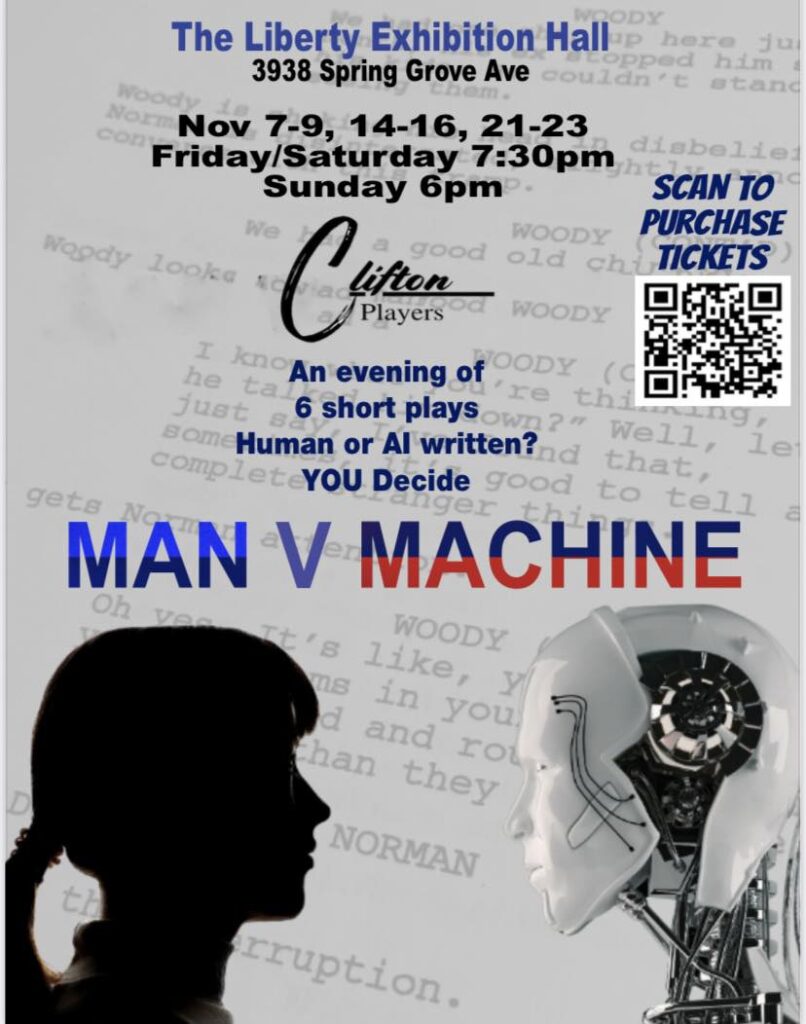Clifton Players’ Man v Machine is a worthy experiment about art and technology
Clifton Players’ Man v Machine is less of a showdown and more of a dialogue. Presented as an intriguing experiment that pits human intuition against Artificial Intelligence, the evening’s premise is simple: six short plays performed in succession, written by an assortment of nationally recognized playwrights–Lee Blessing among them–with two written by Artificial Intelligence. None of the actors, directors, or audience members know who is responsible for which play. The evening culminates with a short talkback with everyone speculating on which plays were “real” and which plays were written by AI.
- The playwrights include: Lee Blessing, Carol Brammer, Zina Camblin, Kevin Crowley, Eli Davis, and Sam Brett Williams.
- Directors include: Pam Schooner, Carol Brammer, Tara Williams, Paul Morris, and Kevin Crowley. F
- Featuring the Clifton Players (listed in alphabetical order): Ryan Bowron, Tracy Connor, Denise Dalvera, Eli Davis, Olaf Eide, Kelly Hale, Delancy O’Toole, Michael Spitz, and Tia Tonae.
There are notable acting moments throughout the experience as well as strong dialogue and sharp directing choices that make impactful moments of revelation over the course of the evening. I’ll admit this was my first time experiencing the Clifton Players and my first time upstairs in the Liberty Exhibition Hall. As an artist-driven cooperative theater company, the Clifton Players created a thought provoking, semi-professional experience well worth the price of admission.
The Venue
Northside’s Liberty Exhibition Hall adds its own charm and texture. Aged wood, dim lighting, and the faint mustiness of countless past performances add an interesting layer to the experience which is mirrored in the set pieces, props, and costumes of the performers. As audiences transition from the lounge to the performance space, they are greeted by a two-person drumming duo creating an ironic juxtaposition between an ancient, primal sound and a night devoted to technological creativity.
The Pieces
The six short pieces present a range of situations from an uncomfortable interaction in a massage parlor to drug fueled breakup sex, and a missed connection at the DMV. Each piece looks at the cause and effect nature of human relationships. These themes are on full display as each scene explores human relationships and emotions and looks at how we connect, struggle, and grow. Despite its AI-themed marketing, the link to technology is more subtle than expected.
Not all of the pieces land equally, but several stand out with rich layers of subtext and emotional honesty. These moments remind us that theatre thrives in nuance which even the best AI platforms struggle with. Which brings me to the question: does it matter that two of the plays were written by Artificial Intelligence?
Man versus Machine
Theatre is fundamentally collaborative. The AI script required a human prompter who shaped and refined the narrative before passing it off to a director, designer, and actors who brought it to life. The end result is a very human experience regardless of the source material.
AI is a tool. A hammer in the hands of a novice creates a significantly different outcome than a hammer in the hands of an expert. This also serves to remind us that the human condition is flawed and that bad writing and bad actors exist even without the use of AI. Similarly, in well trained hands, AI can amplify the best of human creativity and ingenuity. Case in point, one of the paragraphs in this review was written by AI. Can you tell which one? Does it matter?
If anything, Man v Machine makes one thing clear: great theatre will always depend on the complexity of the human heart.
See for Yourself! Get Tickets
Man v Machine runs Fridays, Saturdays, and Sundays from Nov. 7–Nov. 23. To participate in the experiment, visit https://www.brownpapertickets.com/event/6728838 to purchase tickets or to learn more about the production.

NOTE: This production includes adult themes, situations, drug use, and language.





